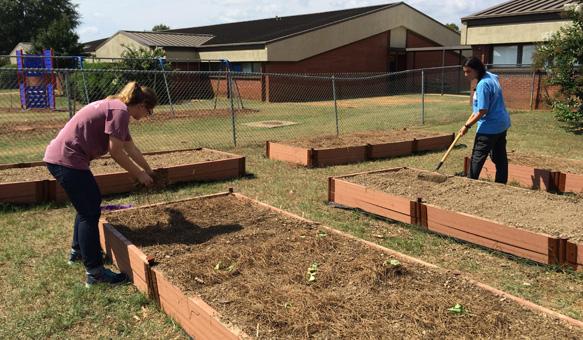The project uses gardens on school property to teach science, math and entrepreneurship to students. Students learn to grow their own food, allowing them easy access to healthy eating options.
“We’re excited to be able to continue impacting more students in Alabama and to be able to spread unique teaching opportunities to a new school,” said Lindsay Turner, executive director of Druid City Garden Project. “There is a direct correlation between people in the program and physical health. We’re excited to take a program that’s already making dramatic results and continue making a difference in Alabama.”
Turner said she has seen positive effects in the classrooms as a result of the project.
“We do a pre-assessment and a post-assessment, and they were able to take that data and figure out that not only are we helping students increase test scores in math and language arts, but also we are able to help students try new fruits and vegetables,” she said. “A lot of kids don’t think about trying something new, but when they put so much into growing food like we have, they are more willing to try it. I feel like a celebrity when I walk into the classroom because the kids are cheering. They are so excited for garden class.”
Druid City Garden Project currently teaches classes at five area elementary schools, the Tuscaloosa County Juvenile Detention Facility and The University of Alabama. Students at the University can choose between two classes, one of which operates through the Honors College.
“Through organic farming you will get to learn so much about how you grow your own fruits and vegetables without using chemicals,” said Joya Elmore, education coordinator for Druid City Garden Project. “Through a class at the University, you can really build a connection back to food.”
The two classes, Let’s Grow and Organic Farming, involve both lectures and hands-on work in gardens. Students who take Let’s Grow assist in the facilitation of garden lessons at elementary schools.
“They are spending three hours a week at one of the elementary schools, getting a chance to get outside the campus bubble and become a part of the community they joined when they joined the university,” Elmore said.
Beau Schaeffer, a freshman majoring in microbiology, grew up eating food from his family garden.
“I think having our own garden helped us eat healthier,” he said. “Once you eat something you’ve grown straight out of the ground, you know no one’s tampered with it. They’re fresh. You pick them right out of the ground and put them on your dinner plate. You become more conscious of eating organic foods.”
Elmore said she appreciates the community built around Druid City Garden Project and its programs.
“It is so exciting to be a part of something that I believe in wholeheartedly,” she said. “I moved here about a year and a half ago, and it has been so wonderful to become a part of the community I live in.”
Druid City Garden Project is accepting applications from elementary schools that wish to be a part of the program. More information can be found on their website, druidcitygardenproject.org.









